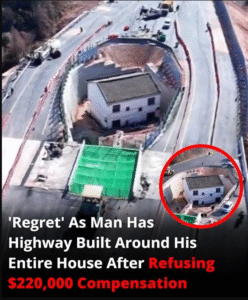
‘Regret’ After Man Refuses $220,000 For Home And Has Highway Built Around It
In a story that has captured international attention, a Chinese homeowner is expressing deep regret after refusing a $220,000 offer from the government to sell his property — only to have a highway constructed around his house instead. The bizarre and somewhat haunting sight of the lone house, surrounded on all sides by asphalt and roaring traffic, has become a symbol of defiance — and consequences.
The man, identified only by his surname, Mr. Luo, had lived in the modest home in China’s Zhejiang province for decades. When local authorities began planning a major highway expansion through the area, most residents accepted government compensation and moved. But Mr. Luo declined the initial offer, believing his home was worth more and unwilling to leave the memories it held behind.
“I thought I was standing my ground for the right reasons,” Mr. Luo reportedly said in a local interview. “But now, I’m just stuck in the middle of cars and noise.”
With legal procedures fulfilled and the government unable to force him out under China’s property laws — which offer some protections to homeowners resisting compulsory acquisition — the construction proceeded anyway. Engineers designed the highway to split and go around his two-story brick home, which now stands alone in a sea of pavement.
The structure is what’s commonly referred to in China as a “nail house” — a term used for homes that remain standing during redevelopment because the owners refuse to sell. In some cases, such as this one, the visual impact is jarring, with a small structure awkwardly stranded amid vast modern infrastructure.
At first, Mr. Luo’s stance earned him sympathy and admiration online. Social media platforms in China were flooded with support, with many calling him “a modern hero standing up to the system.” However, as the highway opened and traffic surged around him, reality began to sink in.
His home, now surrounded by lanes of fast-moving vehicles, is plagued by constant noise, air pollution, and vibrations. Getting in and out safely is nearly impossible without assistance, and daily life has become increasingly isolating. Deliveries can’t be made. Friends rarely visit. And the property’s resale value has effectively plummeted.
“I thought I was preserving something meaningful,” Mr. Luo said. “But what I have now is not a home — it’s a prison in plain sight.”
The government has not extended a new offer, and officials have reportedly washed their hands of the matter, stating that due process was followed and the homeowner had every chance to accept compensation.
The image of Mr. Luo’s house — sturdy but lonely, dwarfed by overpasses and lanes of vehicles — now serves as a powerful metaphor. It raises difficult questions about pride, progress, and the true cost of standing firm in the face of change. For Mr. Luo, the moral of the story has become painfully clear: sometimes, letting go is not surrender — it’s survival.

